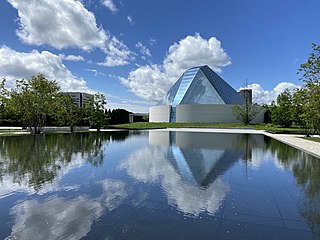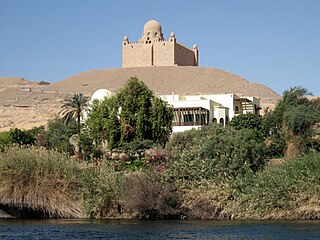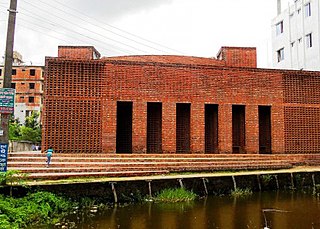
Prince Karim Al-Husseini, known as the Aga Khan IV since the death of his grandfather in 1957, is the 49th and current imam of Nizari Isma'ilis. He has held the position of Imam and the title of Aga Khan since 11 July 1957 when, at the age of 20, he succeeded his grandfather, Aga Khan III. The Aga Khan claims direct lineal descent from the Islamic prophet Muhammad through Muhammad's cousin and son-in-law, Ali, who is considered an Imam by Nizari Isma'ilis, and Ali's wife Fatima, Muhammad's daughter from his first marriage. Aga Khan IV is also known by the religious title Mawlānā Hazar Imam by his Isma'ili followers.

Nizari Isma'ilism are the largest segment of the Ismaili Muslims, who are the second-largest branch of Shia Islam after the Twelvers. Nizari teachings emphasize independent reasoning or ijtihad; pluralism—the acceptance of racial, ethnic, cultural and inter-religious differences; and social justice. Nizaris, along with Twelvers, adhere to the Jaʽfari school of jurisprudence. The Aga Khan, currently Aga Khan IV, is the spiritual leader and Imam of the Nizaris. The global seat of the Ismaili Imamate is in Lisbon, Portugal.

Charles Mark Correa was an Indian architect and urban planner. Credited with the creation of modern architecture in post-Independent India, he was celebrated for his sensitivity to the needs of the urban poor and for his use of traditional methods and materials.

The Aga Khan Award for Architecture (AKAA) is an architectural prize established by Aga Khan IV in 1977. It aims to identify and reward architectural concepts that successfully address the needs and aspirations of Muslim societies in the fields of contemporary design, social housing, community development and improvement, restoration, reuse and area conservation, as well as landscape design and improvement of the environment.

Jamatkhana or Jamat Khana is an amalgamation derived from the Arabic word jama‘a (gathering) and the Persian word khana. It is a term used by some Muslim communities around the world, particularly sufi ones, to a place of gathering. Among some communities of Muslims, the term is often used interchangeably with the Arabic word musallah. The Nizārī Ismā'īlī community uses the term Jama'at Khana to denote their places of worship.

The Aga Khan Development Network (AKDN) is a network of private, non-denominational development agencies founded by the Aga Khan, with the primary focus of improving the quality of life in different regions of Asia and Africa.

Archnet is a collaborative digital humanities project focused on Islamic architecture and the built environment of Muslim societies. Conceptualized in 1998 and originally developed at the MIT School of Architecture and Planning in co-operation with the Aga Khan Trust for Culture. It has been maintained by the Aga Khan Documentation Center at MIT and the Aga Khan Trust for Culture since 2011.

The Aga Khan Museum is a museum of Islamic art located at 77 Wynford Drive in the North York district of Toronto, Ontario, Canada. The museum is dedicated to Islamic art and objects, and it houses approximately 1,200 rare objects assembled by Shah Karim al-Husayni and Prince Sadruddin Aga Khan. As an initiative of the Aga Khan Trust for Culture, an agency of the Aga Khan Development Network, the museum is dedicated to sparking wonder, curiosity, and understanding of Muslim cultures and their connection with other cultures through the arts. In addition to the Permanent Collection, the Aga Khan Museum features several temporary exhibitions each year that respond to current scholarship, emerging themes, and new artistic developments. The Museum Collection and exhibitions are complemented by educational programs and performing arts events.
Bruno Freschi is a Canadian architect and an officer in the Order of Canada, known for his role as chief architect for Expo 86 in Vancouver, British Columbia, Canada. Some of his notable works include Science World in Vancouver, the Ismaili Centre in Burnaby, and the Staples Residence in Vancouver.
The History of Nizari Isma'ilism from the founding of Islam covers a period of over 1400 years. It begins with Muhammad's mission to restore to humanity the universality and knowledge of the oneness of the divine within the Abrahamic tradition, through the final message and what the Shia believe was the appointment of Ali as successor and guardian of that message with both the spiritual and temporal authority of Muhammad through the institution of the Imamate.

The Ismaili Centre, Toronto is a Shia Ismaili Jama'at Khana and community centre, located in Toronto, Ontario, Canada. Completed in 2010, it is the sixth Ismaili Centre in the world. Situated in a park that it shares with the Aga Khan Museum adjacent to the Don Valley Parkway in North York, the Centre represents the permanent presence of the Ismaili Muslim community.

The Ismaili Centre, London, is one of six Ismaili Centres worldwide. Established in South Kensington in 1979, it is a religious, social and cultural meeting place for the Ismaili Muslim community, the first so designed in the Western world.

Rasem Jamal Badran is a Saudi Arabian/Jordanian architect of Palestinian descent whose works are based on a methodological approach in defining Architecture as a continuous dialogue between contemporary needs and historical inherited cultural values.

The Mausoleum of Aga Khan is the mausoleum of Aga Khan III, Sir Sultan Muhammed Shah, who died in 1957. The mausoleum is located at Aswan along the Nile of Egypt, since Egypt was formerly the centre of power of the Fatimids, an Ismaili Shia dynasty.
In Nizari Isma'ili doctrine imamate is a concept which defines the political, religious and spiritual dimensions of authority concerning Islamic leadership over the nation of believers. The primary function of the Imamate is to establish an institution between an Imam who is present and living in the world and his following whereby each are granted rights and responsibilities.

Shia Islam is practiced by a minority of Muslims in the United Arab Emirates. It is also practiced among expatriate Muslim communities living in the country, most notably Iranians, as well as some Arabs, Pakistanis, Indians, and other nationalities. Non-Twelver Shia branches such as Ismailis and the Dawoodi Bohras are also present in the UAE and account for less than 5% of the total population. Shia nationals are concentrated in the city of Dubai, belonging mostly to the latest (1920s) wave of migrants who managed to obtain citizenship.

The Ismaili Centre, Vancouver is an Ismaili Jama'at Khana, located in the Vancouver suburb of Burnaby, in British Columbia, Canada. Completed in 1985, it is one of six Ismaili Centres worldwide. and was the first purpose-built jamatkhana and Ismaili centre in North America. The centre has been the subject of sustained, dedicated academic analysis, and presented as a case study of modern Islamic architecture in the West.

The Ismaili Centre, Dushanbe, is one of six Ismaili Centres worldwide and an Ismaili jamatkhana. It was the fifth purpose-built Ismaili Centre, and the first in Central Asia.

The Bait Ur Rouf Mosque is a distinctive urban mosque located in Dhaka, Bangladesh. Designed by Bangladeshi architect Marina Tabassum and completed in 2012, it has been called a refuge of spirituality in urban Dhaka and received recognition for its beautiful use of natural light and for challenging the status quo of traditional mosque design. Instead of traditional symbolism such as domes and minarets, the mosque relies on open space and the rich interplay of light and shadow to create a prayer space that elevates the spirit.

Al-Darb al-Ahmar is a historic neighbourhood in Cairo, Egypt. It is part of the UNESCO World Heritage Site of Historic Cairo. Located south of the old walled city of Cairo, originally built by the Fatimids in the 10th century, it began to urbanize largely during the 14th century in the Mamluk period.

















